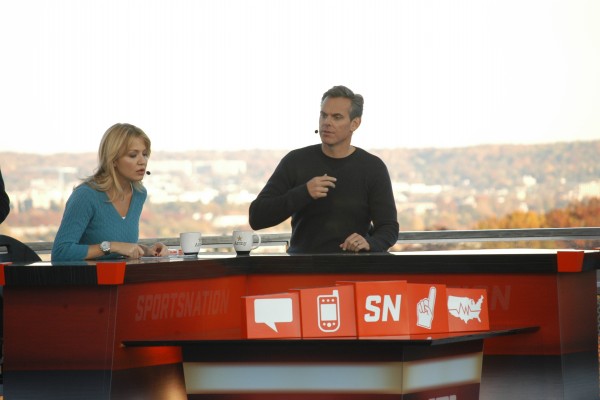ESPN Cuts Commentary to Survive New Media Landscape
Colin Cowherd was fired for remarks against Dominican people. (COURTESY OF DALE SWEETNAM VIA FLICKR)
August 28, 2015
ESPN faces an uncertain future as a place for commentary, namely in the fact that the network has fired three high-value personalities in a fairly short time frame: Colin Cowherd, Keith Olbermann and Bill Simmons. The firings taken separately do represent ESPN distancing themselves from problematic content, but together they also show how ESPN has had to ally itself with content producers: the franchises which ESPN itself covers in depth.
On July 16, Colin Cowherd was terminated for insensitive remarks directed toward the entirety of the Dominican Republic, essentially insulting the intelligence of players from the Dominican Republic. Cowherd made a non-apology for how he phrased his remarks, his joke was condemned by Major League Baseball (MLB), and he was released from his contract by ESPN. Tony Clark, executive director of the MLB Players Association (MLBPA), said, “These recent comments are particularly disappointing when viewed against the backdrop of the important work being done to celebrate and improve the cultural diversity of our game.” However, ESPN has shown that it is willing to stand with the content providing franchises as opposed to problematic talent, and the MLB, which has carved a strong foothold in digital media, will regard this positively. Clark continued, almost foreshadowing ESPN’s actions. “Baseball’s partners and stakeholders should help such efforts, not undermine them,” he said.
Next came the release of Keith Olbermann from the network, after two years of hosting a self-titled show. Olbermann was a high profile talent with a strong voice, and had returned to ESPN where he got his start after the cancellation of his show on MSNBC, “Countdown with Keith Olbermann.” Unfortunately, his assertive voice became muddled in the transition back to his original network. His time at MSNBC made it difficult for him to moderate his comments against companies that ESPN couldn’t risk completely alienating, including Penn State and their cover up of Jerry Sandusky’s abuse. Olbermann had been suspended before his departure for picking a fight through Twitter with Penn State THON campaigners, in regards to the cover up.
The final firing was Bill Simmons. Simmons was not only a thoughtful commentator, but he had an incredible grasp of digital media unlike any other ESPN personality. However, Simmons has consistently clashed with management at ESPN, openly fighting with them on multiple occasions, and was most recently suspended for accusing Roger Goodell of lying after the leak of the video that showed Rice attacking his fiancee Janay Rice. The NFL investigation took place prior to the release of this video, from which the initial punishment was only a four game suspension for Rice, and no other repercussions. Rice was later released from his team after the video was leaked to the public.
“Goodell, if he didn’t know what was on that tape, he’s a liar. I’m just saying it. He is lying.” he said on his podcast, referring to the leaked video. Also according to the leak, the NFL would have had access to this video for their internal investigation. “For all these people to pretend they didn’t know is such [expletive] [expletive],” Simmons continued. He was suspended for three weeks following these remarks, and was released earlier this year.
While Cowherd is rightfully condemned for his offensive remarks, and the same could be said of Olbermann picking fights on Twitter, the logic at play there doesn’t hold as much weight for Simmons’ release. The only explanation is ESPN has moved itself into a “survival mode,” so it can no longer afford to employ someone like Simmons, as he would continue to speak out, unmoderated, with or without their approval. It is more Simmons’ release in context with the other firings that paint a larger picture of what the future of ESPN looks like.
More people are now only signing up for Internet connectivity as opposed to cable connections, according to recent SEC filings by Comcast. Cable television has to find new ways to innovate and create new content. According to ESPN, the best answer is to follow Netflix’s example – maintain strong personal relationships with the companies that create content and try not to alienate them. According to Bob Iger, who owns ESPN as Disney’s CEO, the network is set to become a streaming service like Netflix as well. So, in the future, ESPN may continue to cut down on its commentary and criticisms in order to become more of a content provider, as to not alienate the franchises through the speech of a few individuals. For better or for worse, that is what these firings really represent.










